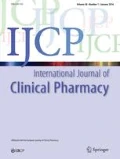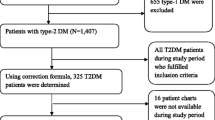Abstract
Background Effective control of diabetes mellitus type 1 (DM1) and type 2 (DM2) can reduce the development and progression of diabetic complications. Therefore, patient education should be considered as an integral part of diabetes management. Objective The aim of the study was to assess DM patients’ perception of knowledge for their medication and attitude towards self-management and pharmacist’s role. Setting The study was conducted at the diabetes out-patient clinic at the Vienna General Hospital (AKH), Division of Endocrinology and Metabolism, Department of Internal Medicine III, Austria. Method The study was a cross sectional survey using patient data from a validated patient questionnaire and medical records. Medical records were evaluated by applying a medication assessment tool. Main outcome measure To assess the quality of diabetes self management the following outcome measures are considered: HbA1c levels, pre- and post-prandial blood glucose levels, prevention of acute episodes of hypo- and hyperglycaemia, reduction of macrovascular risk factors, short term quality of life, adverse effects and treatment tolerance. Results The present study comprised 225 patients with DM1 and 201 patients with DM2, respectively. In comparison to DM2 patients, cardio- and cerebrovascular diseases were diagnosed very rarely in patients with DM1. The risk for these diseases was higher in patients with other factors of the metabolic syndrome, in addition. Overall, 118 of these patients participated in the questionnaire. The level of positive response on diabetes self-care and knowledge with respect to medication for the prevention of diabetes complications, glycaemic control, and treatment goals in diabetes was 81.8 %. The comparison of patients’ perceptions of diabetes self-care and knowledge showed differences among subgroups. Higher perceived knowledge and self-care apparently was associated with DM1. Additional findings of this study indicate that patients do not expect community pharmacists to be integrated in a multidisciplinary diabetes care team. Conclusion Although the level of positive response was found to be high there is still a minority of patients whose level of comprehension appears to be insufficient. Intense pharmaceutical care including patients’ education within a multidisciplinary team could contribute to improvements in those patients.
Similar content being viewed by others
References
http://www.idf.org/. Accessed 01 Feb 2012.
Dorner T, Rathmanner T, Lechleitner M, Schlögel R, Roden M, Lawrence K, et al. Public health aspects of diabetes mellitus-epidemiology, prevention strategies, policy implications: the first Austrian diabetes report. Wien Klin Wochenschr. 2006;118:513–9.
Walker R, Whittlesea C. Clinical pharmacy and therapeutics. 4th Edition, Edinburgh, New York: Churchill Livingstone; 2007. ISBN 9780443102851.
National Institute for Clinical Excellence. (NICE Clinical Guideline 87) Type 2 diabetes. The management of type 2 diabetes. London: NICE; 2009. Accessed 1 Feb 2012.
Wermeille J, Bennie M, Brown I, McKnight J. Pharmaceutical care model for patients with type 2 diabetes: integration of the community pharmacist into the diabetes team—a pilot study. Pharm World Sci. 2004;26:18–25.
Deakin T, McShane CE, Cade JE, Williams RDRR. Group based training for self-management strategies in people with type 2 diabetes mellitus. Cochrane Database Syst Rev. 2005;2: CD003417.
Renders CM, Valk GD, Griffin SJ, Wagner EH, Van Eijk JT, Assendelft WJ. Interventions to improve the management of diabetes in primary care, outpatient and community settings: a systematic review. Diabetes Care. 2001;24:1821–33.
Norris SL, Lau J, Smith SJ, Schmid CH, Engelgau MM. Self-management education for adults with type 2 diabetes: a meta-analysis of the effect on glycemic control. Diabetes Care. 2002;25:1159–71.
Burgers JS, Bailey JV, Klazinga NS, Van Der Bij AK, Grol R, Feder G. AGREE collaboration. Comparative analysis of recommendations and evidence in diabetes guidelines from 13 countries. Diabetes Care. 2002;25:1933–9.
Österreichische Diabetes Gesellschaft. Leitlinien der Österreichischen Diabetes Gesellschaft 2007; http://www.oedg.org/leitlinien.html. Accessed 01 Feb 2012.
American Diabetes Association. Standards of medical care in diabetes—2009. Diabetes Care. 2009;32:1514–22.
UK Prospective Diabetes Study (UKPDS) Group. Intensive blood-glucose control with sulphonylureas or insulin compared with conventional treatment and risk of complications in patients with type 2 diabetes (UKPDS 33). Lancet. 1998;352:837–53.
UK Prospective Diabetes Study Group. Tight blood pressure control and risk of macrovascular and microvascular complications in type 2 diabetes: UKPDS 38. Br Med J. 1998;317:703–13.
National Institute for Health and Clinical Excellence. (NICE Technology Appraisal 60) Guidance on the use of patient-education models for diabetes. London: NICE; 2003. Accessed 2009.
Scottish Intercollegiate Guidelines Network (SIGN). Clinical guidelines–numerical list. http://www.sign.ac.uk/guidelines/published/numlist.html. Accessed 01 Feb 2012.
Power A, McKellar S, Hudson S. A consensus model for delivery of structured pharmaceutical care for the patients with type 2 diabetes mellitus by Scottish community pharmacists. Int J Pharm Pract. 2007;15:255–7.
Kamyar MR, Johnson BJ, McAnaw JJ, Lemmens-Gruber R, Hudson SA. Evaluation of the implementation of medication guidelines in the prevention of coronary heart disease for patients with type II diabetes mellitus in primary care. Pharm World Sci. 2008;30:120–7.
Ernst A, Kinnear M, Hudson S. Quality of prescribing: a study of guideline adherence of medication in patients with diabetes mellitus. Prac Diab Int. 2005;22:285–90.
SurveyGizmo©. Boulder, CO 80301 USA, http://www.surveygizmo.com/ .Accessed 2009.
QuickCalcs Online Calculator for Scientists. La Jolla, CA 92037, USA; http://www.graphpad.com/. Accessed 2009.
McAnaw J, Hudson S, McGlynn S. Development of an evidence-based medication assessment tool to demonstrate the quality of drug therapy use in patients with heart failure. Int J Pharm Pract. 2003;11:R17.
Korsatko S, Habacher W, Rakovac I, Plank J, Seereiner S, Beck P, et al. Evaluation of a teaching and treatment program in more than 4,000 type 2 diabetic patients after introduction of reimbursement policy for physicians. Diabetes Care. 2007;30:1584–6.
Kautzky-Willer A, Kamyar MR, Gerhat D, Handisurya A, Stemer G, Hudson S, et al. Sex-specific differences in metabolic control and cardiovascular risk in patients with type 2 diabetes. Gend Med. 2010;7:571–83.
Al-Qazaz HK, Sulaiman SA, Hassali MA, Shafie AA, Sundram S, Al-Nuri R, et al. Diabetes knowledge, medication adherence and glycemic control among patients with type 2 diabetes. Int J Clin Pharm. 2011;33(6):1028–35.
Al-Adsani A, Moussa M, Al-Jasem L, Abdella N, Al-Hamad N. The level and determinants of diabetes knowledge in Kuwaiti adults with type 2 diabetes. Diabetes Metab. 2009;35(2):121–8.
Berikai P, Meyer P, Kazlauskaite R, Savoy B, Kozik K, Fogelfeld L. Gain in patients‘knowledge of diabetes management targets is associated with better glycemic control. Diabetes Care. 2007;30(6):1587–9.
He X, Wharrad H. Diabetes knowledge and glycemic control among Chinese people with type 2 diabetes. Int Nurs Rev. 2007;54(3):280–7.
Tan M, Magarey J. Self-care practices of Malaysian adults with diabetes and sub-optimal glycaemic control. Patient Educ Couns. 2008;72(2):252–67.
McGowan N, Cockburn A, Strachan MW, Padfield PL, McKnight JA. Initial and sustained cardiovascular risk reduction in a pharmacist-led diabetes cardiovascular risk clinic. Br J Diabetes Vasc Dis. 2008;8:34–8.
Lowey A, Moore S, Norris C, Wright D, Silcock J, Hammond P. The cost-effectiveness of pharmacist-led treatment of cardiac risk in patient with type 2 diabetes. Pharm World Sci. 2007;29:541–5.
Blenkinsopp A, Hassey A. Effectiveness and acceptability of community pharmacy-based interventions in type 2 diabetes: a critical review of intervention design, pharmacist and patient perspectives. Int J Pharm Pract. 2005;13(4):231–40.
Bissell P, Blenkinsopp A, Short D, Mason L. Patients’ experiences of a community pharmacy-led medicines management service. Health Soc Care Commun. 2008;16(4):363–9.
Tinelli M, Bond C, Blenkinsopp A, Jaffray M, Watson M, Hannaford P. Patient evaluation of a community pharmacy medications management service. Ann Pharmacother. 2007;41(12):1962–70.
Austrian Pharmaceutical Chamber. 10 minutes for your health. http://www.apotheker.or.at/ Accessed 10 Feb 2012.
Funding
None.
Conflicts of interest
None.
Author information
Authors and Affiliations
Corresponding author
Additional information
Steve Hudson—Deceased.
Appendix
Appendix
See Table 8.
Rights and permissions
About this article
Cite this article
Lemmens-Gruber, R., Hahnenkamp, C., Gössmann, U. et al. Evaluation of educational needs in patients with diabetes mellitus in respect of medication use in Austria. Int J Clin Pharm 34, 490–500 (2012). https://doi.org/10.1007/s11096-012-9636-0
Received:
Accepted:
Published:
Issue Date:
DOI: https://doi.org/10.1007/s11096-012-9636-0



